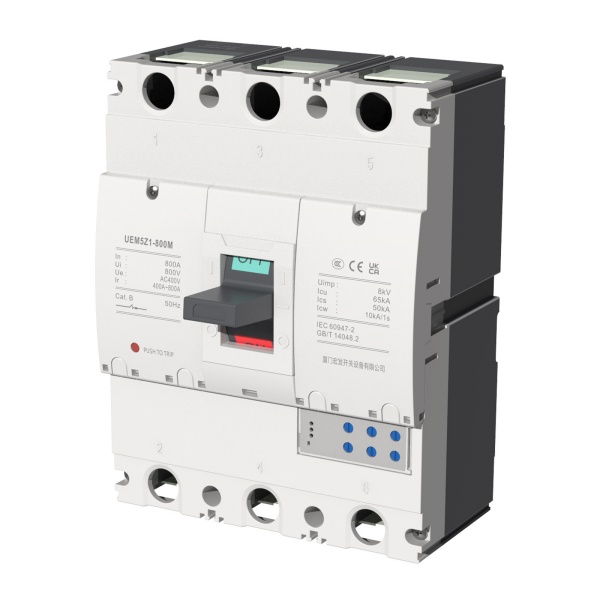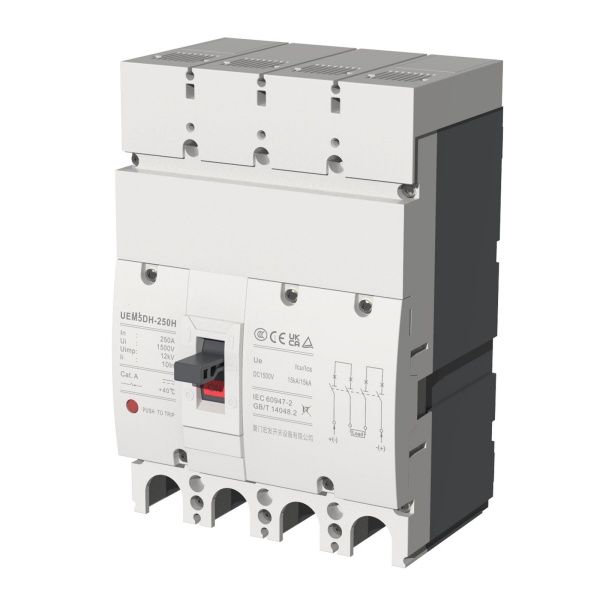In the subject of electrical protection, molded case circuit breakers (MCCBs) are essential part. They are meant to react fast when the current deviates, therefore shielding circuits and machinery from damage. These circuit breakers are essential in many different electrical systems since they not only can handle huge currents but also can modify the tripping current. From generator protection to motor and capacitor bank protection, MCCBs are a versatile tool with great relevance for the safe running of electrical systems.

UEM5Z1 Electronic MCCB Circuit Breaker
1What is a Molded Case Circuit Breaker (MCCB)?
Designed to guard your appliances and circuits from overcurrent, a Molded Case Circuit Breaker (MCCB) is an electrical protection device available in several voltages (400VAC/690VAC/800VAC/1140VAC/1500VDC). MCCBs are rated to sustain 1250 amps and have movable trip settings as we all know. They have three further purposes and are utilized for frequencies of 50 and 60 Hz as well:
They quickly stop very high currents produced by line faults or short circuits, therefore shielding against an electrical fault.
They safeguard in overload situations when the current exceeds the rated value and spans more than usual.
Repair and replacement circuits can be opened or closed using the switching capability.
2 Applications of Molded Case Circuit Breakers
Since they can handle exceptionally high currents, plastic case circuit breakers are often used in heavy-duty applications. MCCBs have the following uses:
1. Protecting Generators
They usually produce hundreds of amperes of output and require expensive generator sets. MCCBs can give the needed shielding to manage the rated current.
2. Guarding Branch Circuitry
Branch circuits run hundreds of amperes of current if you use them for distribution of current. Some times you might have other circuits that call for trip settings. Both of these scenarios call for MCCBs.
3. Tools for Welding
Since small circuit breakers cannot withstand high currents, MCCBs for welding equipment could be somewhat necessary.
4. Capacitor Banks for Protection
Industrial and commercial electrical systems employ these to fix their power factor. MCCB protection becomes essential to lower the current if the drawn current is rather high.
5. guarding motors
Motors also need to be suitably sheltered and molded case circuit breakers help with this. The strong currents generated by soft starts could need to be changed to offer the required overload protection without tripping.
6. Flexible Trip Values for Low Current Uses
MCCBs can be utilized for low current applications even though they are well-known for high current uses. They have changeable travel settings.
3 How to Test Molded Case Circuit Breakers?
Insulation Resistance Test
This test guarantees that you have consistent protection. To test the insulating between the load terminals, supply terminals, and phases, you must detach the MCCB. The protection is insufficient if the insulation resistance turns out to be less than advised value by the manufacturer.
Testing Contact Resistance
Usually, this is a quite low number as, even at a low voltage, the MCCB must let current flow. After testing the resistance of the electrical contacts, you should match your results to manufacturer specifications.
Tripping Test
You need to simulate a fault or overcurrent and then observe the MCCB’s response. The MCCB will heat up with high current, so you want to run this test last. This is a two-part exam conducted in the following sequence:
Thermal Protection
Here you operate with an overcurrent around 1.5 times the rated current. The circuit breaker should ideally trip in line. If it doesn’t, then it has failed in thermal protection.
Magnetic Protection
Here you want to replicate a fault by pulseing a quite high current. The defect might be really harmful, hence the pulse must be quite short. Magnetic protection tends to be instantaneous and the application handles these very well.

UEM5DH MCCB Breaker
Simply said, molded case circuit breakers are absolutely essential in contemporary electrical systems. Providing overcurrent protection, overload protection, and short circuit protection guarantees the safety of electrical equipment and circuits. Key to ensuring MCCBs—insulation resistance tests, contact resistance tests, and trip tests—have their intended operation and dependability is routine testing and maintenance of them. These tests protect personnel’s and property’s safety as well as aid prolong the lifetime of the equipment by preventing possible electrical breakdowns. Thus, any electrical system depends on appropriate choice and maintenance of MCCBs.
Post time: 7 月-18-2024


